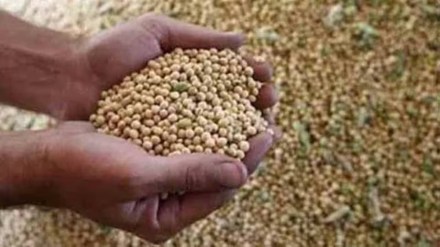With the mandi prices of soybean—a key kharif crop—falling below the minimum support price (MSP), government agencies such as the farmers’ cooperative Nafed and the National Cooperative Consumers’ Federation of India (NCCF) will soon begin procuring oilseeds from farmers at MSP within the next couple of weeks.
Sources told FE that the agriculture ministry has approved the procurement of 1.56 million tonne (MT) of soybean under the price support scheme (PSS) from farmers in Maharashtra (1.3 MT), Karnataka (0.1 MT), and Telangana (0.05 MT). The government is also expected to announce MSP purchases of oilseeds in Madhya Pradesh later this week.
“There is no target for the volume of soybean procurement under PSS as it depends on the market rate in each state,” an official said. On August 30, the Centre had written to four soybean-producing states—Madhya Pradesh, Maharashtra, Gujarat, and Rajasthan—urging them to initiate PSS operations if prices remain below MSP.
Sources said that robust crop prospects and cheaper imports of edible oil, due to low tariffs, have impacted mandi modal prices of soybean, currently ruling around Rs 4,376 per quintal—approximately 10% below the MSP of Rs 4,892 per quintal in key producing states like Madhya Pradesh, Maharashtra, Karnataka and Telangana.
Soybean is sown in 12.51 million hectare (MH), up 9% compared to previous year. The total oilseed variety sown this season according to the agriculture ministry has been higher than last five years’ average of 12.29 MH. According to Soybean Processors Association of India (SOPA), the output of oilseed variety in the 2023-24 crop year was estimated at 11.9 million tonne (MT), while the agriculture ministry has estimated output of oilseed variety at 13.05 MT.
“As of today, the output for 2024-25 crop is expected to be better than last year,”D N Pathak, executive director, SOPA, had said while adding the actual crop conditions can be assessed by early October when the harvesting of oilseed commences.
In the last rabi season, despite having a record mustard production of 13.16 MT in 2023-24 crop year (July-June), the mandi prices were ruling below the MSP and the government agencies had purchased 1.2 MT of mustard from the farmers in key producing states of Haryana, Madhya Pradesh, Rajasthan and Uttar Pradesh.
India is the world’s second-largest consumer and number one vegetable oil importer. The country meets about 58% of its consumption of around 24 MT annually through imports.
Currently, India produces about 42% of its domestic edible oil consumption requirement. Mustard (40%), soybean (24%) and groundnut (7%) are other oils that have a share in domestic production.
Currently, crude palm, soybean, and sunflower oil imports attract only a 5% agri infra cess and a 10% education cess, resulting in a total tax incidence of 5.5%. Because of record imports, the domestic prices of edible oil varieties such as mustard and soybean have been impacted.
Earlier, the Commission for Agricultural Costs and Prices (CACP), had recommended that the MSP for the 23 crops to the government, had suggested extending the national mission on edible oils to major oilseeds such as mustard, soybean, sunflower, groundnut, etc. and ensure higher participation of the private sector in procurement operations of oilseeds
